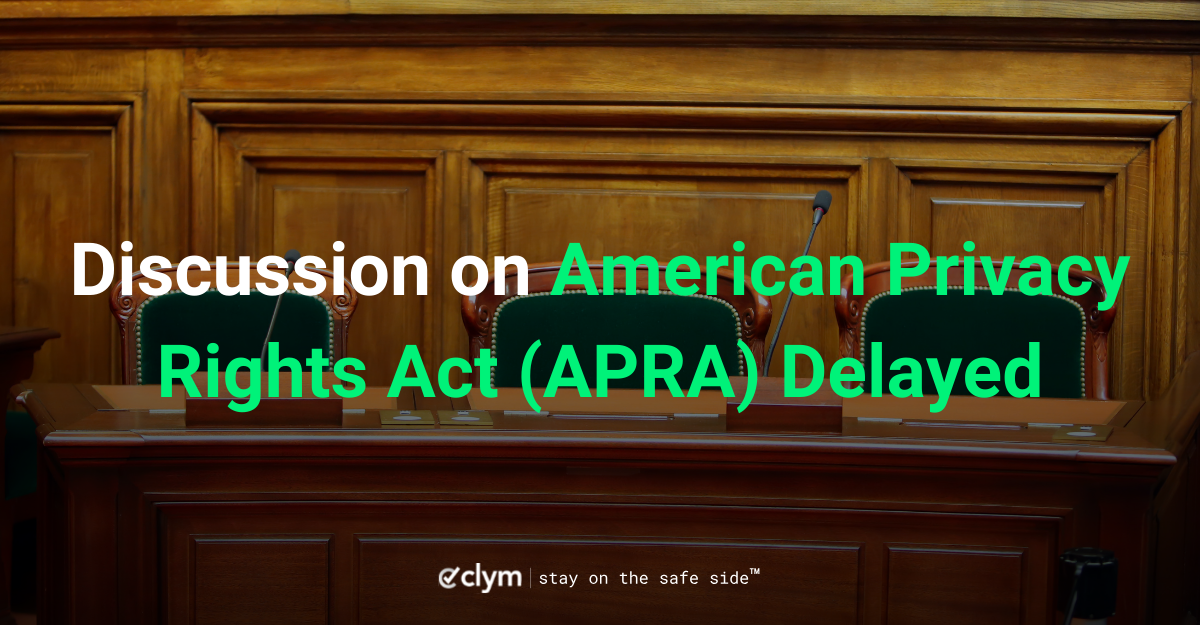Discussion on American Privacy Rights Act (APRA) Delayed

The planned discussion on the APRA (American Privacy Rights Act) by the House Energy and Commerce Committee on June 27th was unexpectedly canceled, after a week of concerns raised by some stakeholders and disagreements within the Republican party about the latest version of the bill.
The American Privacy Rights Act (APRA) is a proposed law that would regulate how companies collect, use and share your data. The law would apply to most businesses and organizations, but there are some exceptions like small businesses and government agencies.
Here are some key things the law would require:
- Companies can only collect data they actually need.
- Companies must tell you how they are using your data and give you ways to control it, like letting you delete it or opt out of targeted advertising.
- Companies would need to have strong security measures in place to protect your data.
There were concerns that the APRA might not be as strong as some existing state laws and could make it harder for states to come up with their own privacy protections. The law was first proposed on April 7, 2024, and faced opposition being accused of potentially lowering the standards set by existing state laws such as the California Consumer Privacy Act (CCPA). On April 16, 2024, the California Privacy Protection Agency (CPPA) issued a letter to the Chairs of the House Energy & Commerce Committee and the Innovation, Data, and Commerce Subcommittee, which outlined several reasons against adopting the American Privacy Rights Act (APRA), compared to the existing California Consumer Privacy Act (CCPA). This was followed on April 17, 2024, by the Energy and Commerce Committee Ranking Member, Frank Pallone, Jr.’s opening remark at a legislative hearing in which he outlined reasons why the American Privacy Rights Act (APRA) should not be adopted without further enhancements.
June 27th was the markup date for the next round of discussion on the changes made to APRA. Committee members from both parties and the public were arriving for the meeting when they were informed of the cancellation. The reasons for the delay seem to be complex, with reports suggesting disagreements between the Committee Chair and Republican leadership regarding the bill’s content. Some changes, such as removing privacy protections and limitations on algorithmic decision-making, were reportedly made to address Republican concerns. However, despite this, some Republican members still remained opposed, particularly to a provision allowing individuals to sue companies for privacy violations.
Committee Chair, Cathy McMorris Rodgers, made a statement after the cancellation was announced saying that the committee will revisit the bill but needs more time to address confusion and misrepresentation about the legislation. This followed a statement by Chair Rodgers before the meeting, emphasizing the importance of a federal privacy law:
At its core, the massive commercial surveillance of data is fuelling the problem. Nearly every data point imaginable is being collected on us with no accountability. They are using our data against us, sowing division, manipulating truth, and diminishing our personal identities. We cannot continue down this path. The American people are asking Congress to step up and pass a privacy bill. It is foundational to our future and the next generation.
The Democratic ranking member of the committee, Frank Pallone, expressed strong disapproval of the cancellation, saying that
It’s outrageous that Republican Leadership would interfere with the Committee’s bipartisan regular order process. I commend Chair Rodgers for her dedication to giving Americans back control of their data. This is a dire problem that Congress needs to solve. It is too important to the American people to not get this done. I’m committed to continuing to work with Chair Rodgers – we’re not giving up. The Energy and Commerce Committee is the only Committee that has had the willingness to take on Big Tech on behalf of the American people. This Committee has a history of taking on the hard problems. If this was easy somebody else would have done it already.
At this time it remains unclear when or if the committee will hold a rescheduled discussion on the APRA, as no new date was mentioned nor any plans for the other bills that were supposed to be marked up that same day.
Alex is a Content Developer at Clym, where he researches and writes about everything related to data privacy and web accessibility compliance for businesses, helping them stay informed on their compliance needs and spreading awareness about making the web safer and more inclusive. When he’s not writing about compliance, Alex has his nose in a book or is hiking in the great outdoors.
Learn More →